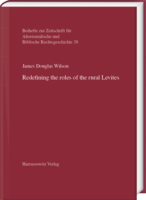|
|
more titles of the subject:
Please note: With adding digital Products to your cart
the payment will be handled via PayPal. The download will be provided after the payment is confirmed. The Levites in the book of Deuteronomy are portrayed in the cultic and social spheres of Israel. According to the prevailing interpretation of Israel’s cultic development, especially in the wake of cultic centralization, the Levites transitioned from their roles as local high place priests to that of the locally unemployed and impoverished. Utilizing ritual, sociological and anthropological criticism, and drawing from the portrayal of the Levites in and outside of Deuteronomy, James Douglas Wilson's study considers an alternative perspective on roles and functions of the Levites within Israel’s gates.
Its purpose is to demonstrate that these “rural” Levites did not entirely lose their local cultic roles, but that they may have been responsible for performing several social-level tasks which corresponded to their cultic roles based on their permanent duties in the sanctuary and their overall function as socio-cultic mediators and ritual specialists. Their roles are generally described in the Old Testament as “guard duty” and “manual labor,” but more specifically it is asserted here that the rural Levites performed local scribal duties associated with the triennial tithe and legal cases and performed ritual duties related to local meat consumption. |
|||||||||||||||||||||||||||||||||||||||






